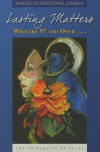Nimrod International Journal – Spring/Summer 2013
Read vertically top to bottom, the final words of the lines of Ronald Wallace’s “Sex at Seventy” form this haiku by Issa:
Read vertically top to bottom, the final words of the lines of Ronald Wallace’s “Sex at Seventy” form this haiku by Issa:
In my hidden house
No teeth left in the mouth
But good luck abounds.
A gentle, happy way to look at aging, yes? Then read Wallace’s sonnet—or at least the last part of it:
You there! Yes, you! Who says the
old aren’t sexual beings, too? Is your mouth
filled with laughter? We’re laughing, too, but
it’s a beautiful laughter, laughter so feel-good
it becomes us. We are the laughter, and, with luck,
will be the laughter, no matter what abounds.
Nimrod is 57 years old this year—a remarkable achievement in the world of litmags. Every year their spring issue is themed, often dedicated to writers from a specific region of the world, and this year, the theme is “57+,” a wondrous realm, according to Wallace and the almost 100 other poets, prose writers, and artists whose work fills this optimistic, mature, altogether gratifying issue. As grad-school and assistant-prof numbers grow and their need to publish rises with them, a certain generational attitude tinges many litmag offerings—experimentation (not a bad thing), nihilism (a trendy thing), stories about being a grad student or a new assistant prof (a common and conflict-ridden thing, certainly grist for the story mill). But what we have here are stories and poems observing from a high vantage point. Problems have been (and continue to be) encountered and resolved to one degree or another, so there’s a certain tranquility in the face of One More Obstacle. The skills and techniques of writing have been mastered to a degree, along with confidence in the voice and the viewpoint, so the need to dazzle is less of an issue than the need to share what’s been learned.
Oh, but there’s plenty to dazzle the discerning reader. Wallace’s “golden shovel haiku sonnets” are only one (well, five) example(s). Venerable names like Ted Kooser, Stephen Dunn, and Henry Morgenthau consort with writers from all over the United States as well as Australia, Canada, China, Haiti, Slovenia, and other far-flung locations. There’s more poetry than prose here—a statement about the mindset of a certain age? Maybe. Or maybe poetry is the genre of memory-image, or loss, or both, as in Matthew J. Spireng’s “One”:
I must, back then, have learned
or how now do I know one, or two or
more? It might have been a lesson
. . . . . . . . . . . . . . . . . . . . .
or a revelation, one moment
no difference to me between
one and two, then: one
and one and one . . .
. . . . . . . . . . . . . . . . . . . . .
One little boy, perhaps still
an infant, discovering one thing after another.
This lovely poem is juxtaposed with a perfectly matched photograph (by Glenn Herbert Davis, but excellent editing and sequencing is no coincidence) in which a little boy lies on the ground in a woodsy camp, raising a single stick to the misty sky. One. Yes.
The great advantage of alert, creative age is that there are so many memory-images to call upon. “The Commission,” by Anita Vitacolonna, presents a couple choosing items to be included in a still life—”woven raffia from the Congo, // a Dogon mask, a leatherbound volume from Florence.” Vitacolonna continues, “Kumquats overflowed / a dish resting on Florentine leather . . . // . . . We watched / as brush strokes transformed the narrative of our lives heavy with objects.” Concise yet image-heavy, sound-aware yet luminous, this poem exemplifies the clarity age can bring.
So does Vince Sgambati’s story “What Took You So Long?” The middle-aged protagonist has moved away from the scene of a shameful divorce only to discover new things about himself that his wife must have known all along. Sometimes only time and trouble can bring the illumination we need, and afterward, happiness of a new kind.
Another fine prose piece is Susan Eisenberg’s “My Parents’ Health Declines,” an energetic, almost-lighthearted index of the steady deterioration older age often brings—poignant but not pathetic: “They continued to do their own shopping. He held onto the cart for stability and slowly circumnavigated the store while she darted down each aisle they passed . . .” You can hear Eisenberg’s mellifluous language; it doesn’t let you mourn.
The subject matter of the issue as a whole isn’t necessarily age, though; it’s more the wry intelligence that comes only after life lived long and sharp. The issue is a resounding success because the country of 57+ is a rich one. Congratulations to Nimrod as it moves fearlessly forward into the last part of its own rich sixth decade.
[nimrod.utulsa.edu]





